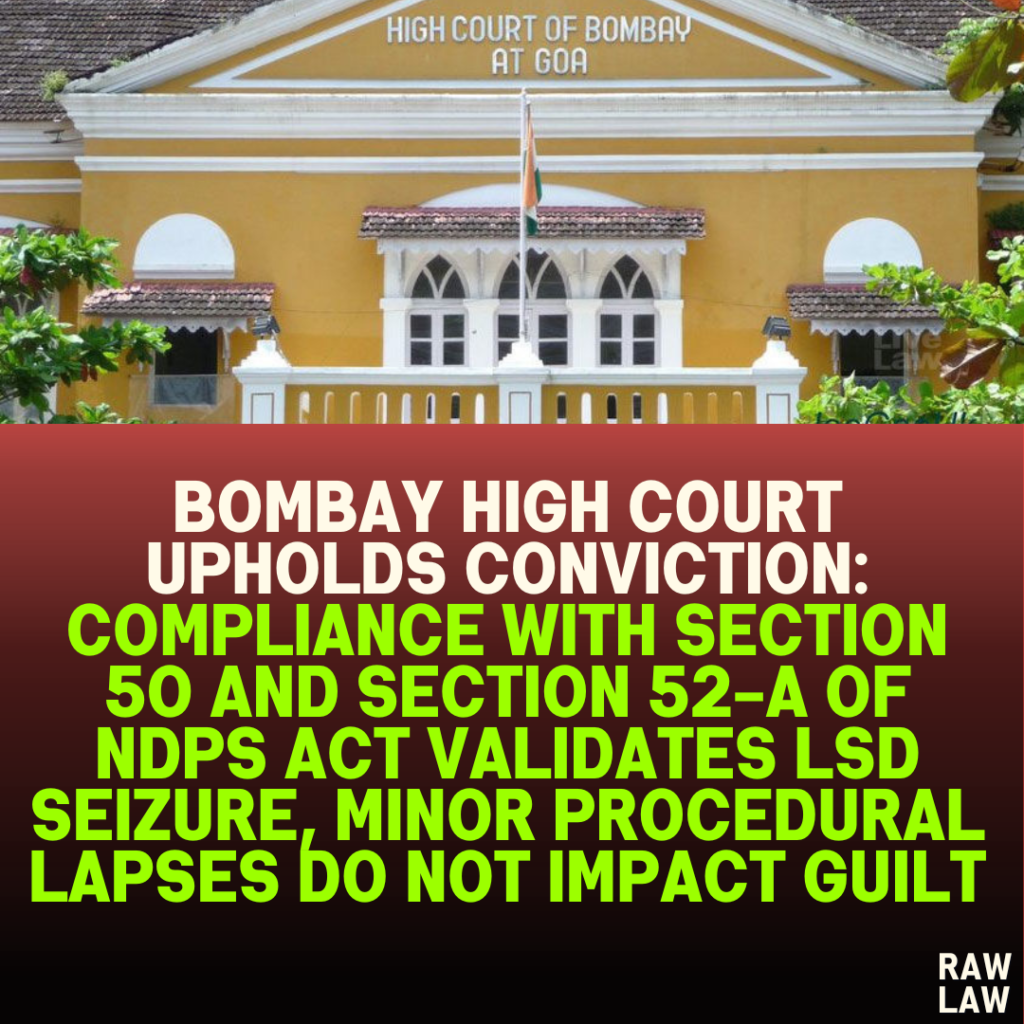Court’s Decision
The High Court of Bombay at Goa dismissed the Criminal Appeal, affirming the conviction and sentence of the appellant under Section 22(c) of the Narcotic Drugs and Psychotropic Substances Act, 1985 (NDPS Act). The court found that the prosecution had successfully proven the guilt of the appellant beyond a reasonable doubt and ruled that there was compliance with the mandatory provisions under Sections 50 and 52-A of the NDPS Act. The conviction included a 10-year rigorous imprisonment and a fine of ₹1 lakh, with a default sentence of one-year imprisonment if the fine is not paid.
Facts
On August 18, 2014, the Raiding Officer, PSI Sitakant Naik, received specific and reliable information that a person fitting a particular description would be delivering drugs near the Sacred Heart of Jesus School, Anjuna, Bardez, Goa. The raiding team was formed, and two Pancha witnesses were arranged. Upon reaching the location around 2:10 a.m. on August 19, 2014, the raiding team spotted an individual matching the description arriving on a red and black Honda Dio scooter.
The Raiding Officer introduced himself and informed the accused of his right to be searched in the presence of a Gazetted Officer or Magistrate, which the accused declined. A personal search was conducted, and the officer recovered a perforated paper sheet containing 30 square-shaped pieces with a symbol of ‘OM’ in pink color. The officer tested a small piece of the sheet and confirmed it contained LSD. The entire contraband weighed 0.4 grams, which is classified as a commercial quantity under the NDPS Act.
Issues
- Whether the Raiding Officer complied with Section 50 of the NDPS Act before searching the accused?
- Whether the Incharge of the Police Station complied with Section 52-A of the NDPS Act regarding the custody and handling of the contraband?
- Whether the prosecution proved that the contraband sealed at the spot was the same as that sent to the Laboratory?
Petitioner’s Arguments
The petitioner argued that:
- There was non-compliance with Section 50 of the NDPS Act as the accused was not properly informed of his right to be searched before a Gazetted Officer or Magistrate.
- There was a violation of Section 52-A of the NDPS Act as the procedure for sampling and forwarding the contraband was not followed.
- There was a possibility of tampering with the contraband due to the delay in sending the sample to the Forensic Science Laboratory.
- The weight of the substance was not conclusively proven, and the lack of weight measurement at the Laboratory further cast doubt on the integrity of the seized substance.
Respondent’s Arguments
The respondents argued that:
- The Raiding Officer complied with the mandatory provisions of Section 50 of the NDPS Act by informing the accused in Hindi about his right to be searched in the presence of a Gazetted Officer or Magistrate.
- The entire contraband was forwarded to the Laboratory without any tampering, and the delay in sending the sample did not impact its integrity.
- The weight of the contraband was accurately measured and recorded during the raid, and the small quantity of the contraband justified sending the entire quantity for testing instead of just a sample.
Analysis of the Law
The court analyzed the provisions of Sections 50 and 52-A of the NDPS Act in light of various precedents, including:
- State of Punjab vs. Baldev Singh, where the Supreme Court held that it is mandatory to inform the accused of their right to be searched in the presence of a Gazetted Officer or Magistrate.
- Vijaysinh Chandubha Jadeja vs. State of Gujarat, which reiterated that strict compliance with Section 50 is required.
- Mohan Lal vs. State of Punjab, where the Supreme Court emphasized the necessity of complying with Section 52-A for the safe custody and disposal of seized contraband.
Precedent Analysis
The court referred to the judgments in State of Punjab vs. Baldev Singh and Vijaysinh Chandubha Jadeja vs. State of Gujarat to affirm that compliance with Section 50 is mandatory and non-compliance would render the search and seizure invalid. However, in this case, the court concluded that there was compliance as the accused was informed of his rights in a language known to him.
Court’s Reasoning
The court found that the Raiding Officer complied with Section 50 by informing the accused of his rights in Hindi. The slight discrepancy in the terminology used by the independent witness (Pancha) did not undermine the legality of the search. The court also noted that the entire contraband was forwarded to the Laboratory, and thus, there was no violation of Section 52-A.
The court dismissed the petitioner’s arguments regarding the weight of the contraband and tampering, holding that the substance’s weight was properly recorded during the raid, and the chain of custody was not broken. Furthermore, the minor discrepancies in the testimonies did not create any reasonable doubt about the integrity of the seized contraband.
Conclusion
The court dismissed the appeal, affirming the conviction and sentence of the accused for possession of a commercial quantity of LSD under Section 22(c) of the NDPS Act.
Implications
The judgment reaffirms the mandatory nature of compliance with Sections 50 and 52-A of the NDPS Act and emphasizes that minor discrepancies in procedure do not necessarily vitiate the search and seizure if the overall compliance and integrity of the evidence are maintained. This decision serves as a precedent for handling cases involving small quantities of narcotics where forwarding the entire contraband for testing is more practical than sampling.
